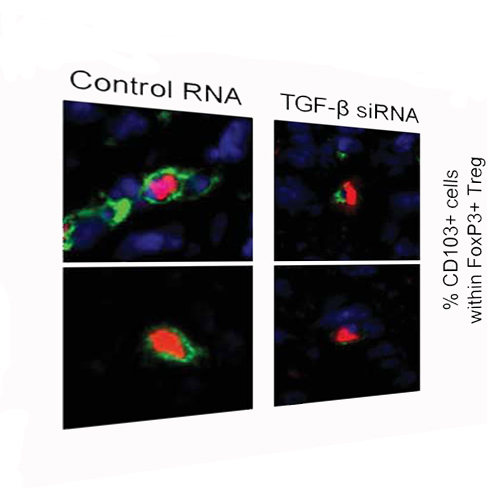CD103 is a hallmark of tumor-infiltrating regulatory T cells
15-Nov-2011
International Journal of Cancer, 2011, DOI: 10.1002/ijc.25902, Volume 129, Issue 10, pages 2417–2426 published on 15.11.2011
International Journal of Cancer, online article
International Journal of Cancer, online article
Regulatory T cells (Treg) mediate tolerance towards self-antigens by suppression of innate and adaptive immunity. In cancer patients, tumor-infiltrating FoxP3+ Treg suppress local anti-tumor immune responses and are often associated with poor prognosis. Markers that are selectively expressed on tumor-infiltrating Treg may serve as targets for immunotherapy of cancer. Here we show that CD103, an integrin mediating lymphocyte retention in epithelial tissues, is expressed at high levels on tumor-infiltrating FoxP3+ Treg in several types of murine cancer. In the CT26 model of colon cancer up to 90% of the intratumoral FoxP3+ cells expressed CD103 compared to less than 20% in lymphoid organs. CD103+ Treg suppressed T effector cell activation more strongly than CD103neg Treg. Expression of CD103 on Treg closely correlated with intratumoral levels of transforming growth factor β (TGF-β) and could be induced in a TGF-β-dependent manner by tumor cell lines. In vivo, gene silencing of TGF-β reduced the frequency of CD103+ Treg, demonstrating that CD103 expression on tumor-infiltrating Treg is driven by intratumoral TGF-β. Functional blockade of CD103 using a monoclonal antibody did however not reduce the number of intratumoral Treg, indicating that CD103 is not involved in homing or retention of FoxP3+ cells in the tumor tissue. In conclusion, expression of CD103 is a hallmark of Treg that infiltrate TGF-β-secreting tumors. CD103 thus represents an interesting target for selective depletion of tumor-infiltrating Treg, a strategy that may help to improve anti-cancer therapy.











